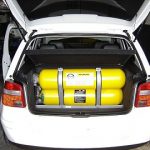The Federal Government has unveiled new plans to boost the country’s automotive industry with targeted policies and incentives aimed at positioning Nigeria as West Africa’s leading hub for Compressed Natural Gas and electric vehicle manufacturing. The announcement was made at the opening of the twenty-fifth Abuja International Motor Fair, an event themed around innovation, sustainability and growth in the automotive sector.
According to the government, the initiative aligns with the Renewed Hope Agenda, which places strong emphasis on creating a competitive automotive ecosystem anchored on local production, technology adoption, job creation for young people and a gradual transition to cleaner energy. The administration noted that the automotive sector is central to its economic vision and that the widespread deployment of CNG buses for public transport remains vital in easing the impact of ongoing economic reforms while ensuring affordable mobility for millions of Nigerians.
The government also stressed the importance of developing innovative financing models to improve access to vehicles built in Nigeria. It called for single-digit interest loans that would allow ordinary citizens and small businesses to purchase locally assembled vehicles without prohibitive financial barriers. Commercial financial institutions were urged to create new funding mechanisms that will stimulate activity across the automotive value chain.
During the fair, the Ministry of Industry, Trade and Investment reaffirmed its commitment to accelerating growth in the automotive sector, describing it as a major driver of broader economic goals. The ministry’s delegation explained that the event offers a platform to showcase progress achieved under the National Automotive Industry Development Plan, especially the gains recorded in domestic vehicle assembly and component manufacturing.
Representatives of the automotive design and development council added that the agency is intensifying work to deepen local content and reduce over-reliance on imported parts. They highlighted ongoing efforts to support assemblers and component manufacturers whose capacity continues to grow despite economic pressures, reinforcing the message that made-in-Nigeria vehicles and components can compete across African markets.
This development carries important implications for MSMEs across the automotive value chain. Small businesses involved in fabrication, parts supply, auto-care services, energy conversion and transport operations stand to benefit from policies that expand local production and make cleaner-energy vehicles more accessible.
As Nigeria moves toward a CNG and EV-driven future, MSMEs remain positioned to adapt, innovate and build new opportunities within the continent’s emerging mobility economy.










